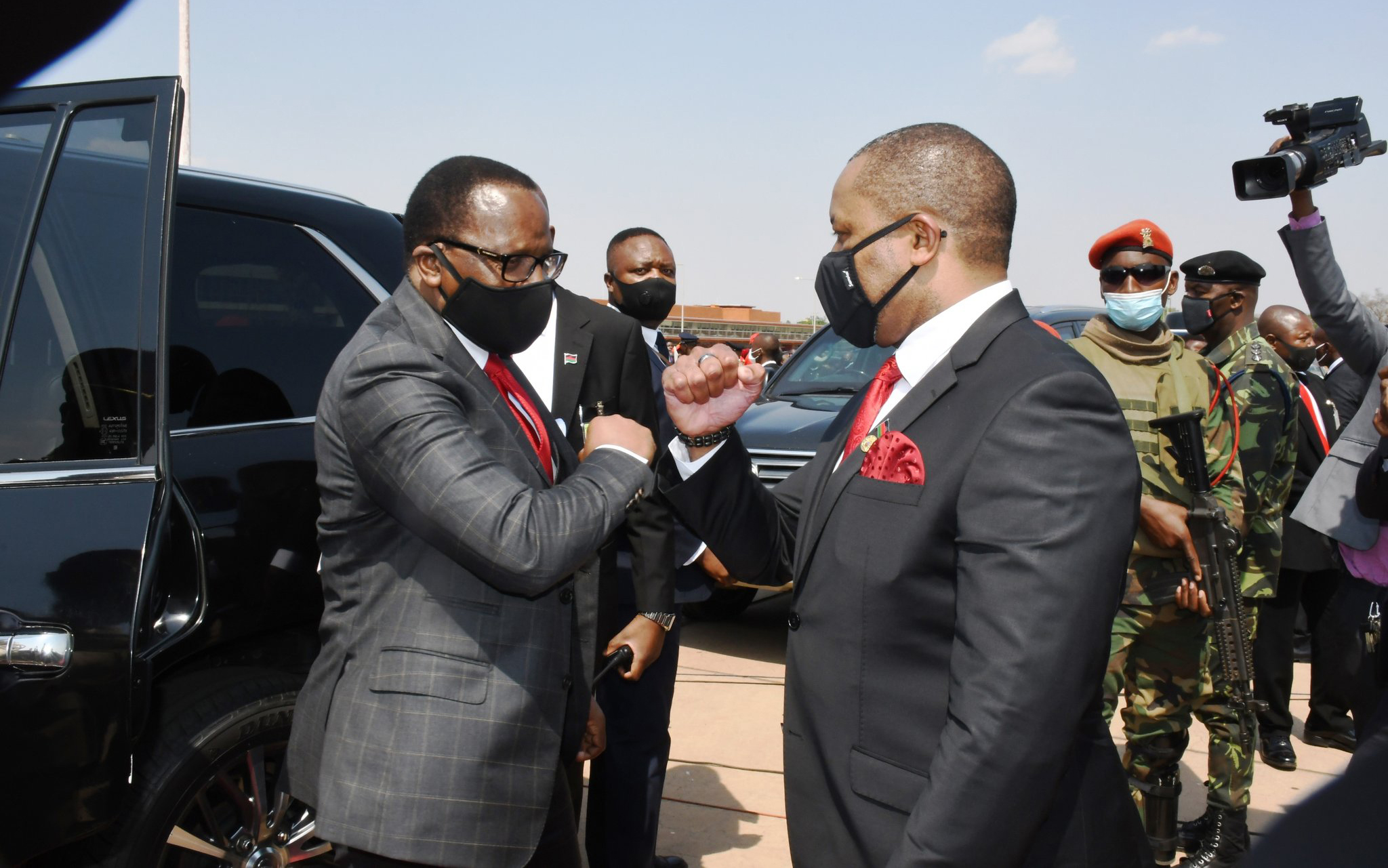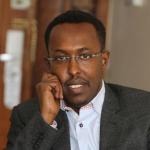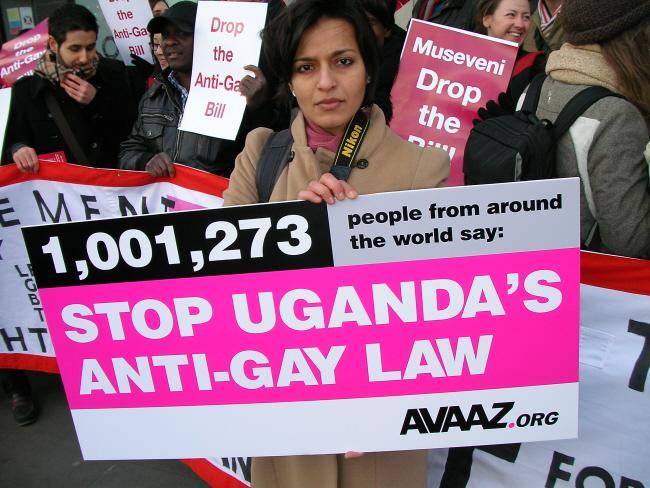What next in Chakwera’s anti-corruption crusade in Malawi?

A scandal from the last regime forced the president to fire senior officials, suspend his VP and risk breaking the ruling coalition.

President Chakwera and his VP, Saulos Chilima in happier times. More recently, Chilima was arrested for corruption. Photo courtesy: Joseph Kayira
The arrest of Malawi’s Anti-Corruption Bureau (ACB) Director General, Martha Chizuma, last December, following a criminal defamation complaint from Director of Public Prosecutions (DPP), Steven Kayuni, reveals how delicate and fragmented government systems can be when it comes to rooting out corruption.
In a January 2022 leaked audio, Chizuma alleged she was finding it extremely hard to make progress against the corrupt, as there was little support from the presidency and some government agencies, notably the DPP.
The allegations and, perhaps, the leaked audio itself, infuriated President Lazarus Chakwera. He issued Chizuma a strong warning. Later, Chakwera would say that Chizuma regretted her actions and that he had forgiven her.
Until recently, to prosecute a corruption case, the ACB had to obtain consent from the DPP. That changed last September, when Parliament amended the Corrupt Practices Act (CPA) to remove the relevant provision. Proponents of the amendment said the previous piece of legislation delayed cases, leaving the anti-graft body with a backlog of cases awaiting trial.
The amendment came amid bad blood between the two agencies, with the DPP Kayuni refusing to grant the ACB consent to prosecute a case involving a British national and longtime security contractor, Zuneth Sattar, and businessperson Ashok Nair. Also known as Ashok Sreedharan, Nair is a close associate of Sattar, whose relations with the previous regime of Peter Mutharika made him notorious in the corridors of power. Sattar’s companies were awarded tenders in the Malawi Police Service, the Malawi Prisons Service and the Army. There are allegations that, through Nair, he has been bribing public officers in exchange for government contracts.
Chizuma’s leaked audio has been a bone of contention between her and the DPP. Police arrested and charged Chizuma with making use of speech capable of prejudicing a person against a party to judicial proceedings, contrary to section 131 (1) d of the penal code.
Police spokesperson, Peter Kalaya, said: “High Court Judge, Anabel Mtalimanja, ruled in September 2022 that any individual or party that felt aggrieved by the contents of the leaked audio clip could proceed to complain to police for criminal action against the ACB director general.”
Western embassies condemned the heavy-handedness and unorthodox manner in which Chizuma was arrested. They threatened to issue economic sanctions and travel bans against government officials.
Chakwera fires DPP
Angered with the development, and under pressure from his Western funders, President Chakwera suspended Kayuni. He also instituted a Commission of Inquiry on the arrest of Chizuma.
In its recommendations, the Commission censured Kayuni for bringing a personal complaint to the police in his capacity as DPP.
“I consider this a great failure for Kayuni and a great disappointment to me,” said Chakwera. “As such, to prevent him from using a public office to settle personal injury, I have removed Kayuni from office with immediate effect and I thank him for his many years of service.”
Another bone of contention was the lack of trust among offices mandated to fight corruption. Releasing its findings in January 2023, the Edward Twea-led Commission of Inquiry recommended that the DPP and ACB collaborate to complete prosecution of major corruption cases to restore public confidence in the institutions.
The Commission found Chizuma culpable in the audio tape saga; all charges against her were, however, dropped. Her lawyer, Martha Kaukonde, claimed the inquiry disregarded her client’s testimony.
“My client is obviously disappointed that what she presented to the Commission regarding the main issue that the inquiry [has] to do with the manner and appropriateness of the arrest, was not presented,” Kaukonde said.
No to selective justice
President Chakwera won the presidency on an anti-corruption platform. He pledged to deal with corruption with the seriousness it needed. But two years down the line, there are allegations the fight against corruption has become a political tool to silence critics.
The Catholic Church, which wields significant moral authority in Malawi, said in a statement last year that no one should be pressurised, intimidated or influenced by threats, or by any other means in the carrying out of their work for the good of the country.
“We plead, in the interest of building a more just and transparent Malawi that benefits all its citizens, that any of the investigations or cases which the ACB is dealing with are not in any way obstructed or influenced. Let no suspect, however powerful, wealthy or who their connection are, be shielded or protected provided that he or she is given proper recourse to the legal processes of the courts,” said the Catholic bishops in a statement.
On 25 November, 2022 Vice-President Saulos Chilima was arrested by the ACB. The bureau said it had arrested him on allegations that between March and October 2021, Chilima received $280,000 and other items from Sattar as a reward for helping the businessman’s companies – Xavier Limited and Malachitte FZE – secure government contracts.
Chilima was charged with three counts of corruption: two for receiving advantage for using influence in regard to government contracts; and one for failing to make a full report to a police officer or an officer of the ACB that an advantage had been corruptly given.
In June last year, Chakwera fired some senior government officials who were involved in suspicious dealings with Sattar. The ACB found that 84 individuals allegedly received money from the businessman. Out these, 13 have been extensively investigated, including the vice president. Chakwera said, constitutionally, he was unable to remove Chilima from office.
“As for the Vice President, his office is unique in that the Constitution does not provide for his suspension or removal from it by the President, because he holds that office by the will of Malawian voters, which I respect,” said the president. “As such, the best I can do for now, which is what I have decided to do, is to withhold from his office any delegated duties while waiting for the Bureau to substantiate its allegations against him and to make known its course of action in relation to such.”
From the arrest of Chilima and Chizuma, and the sacking of Kayuni as DPP and many who are to follow, the cardinal point is that President Chakwera is finding it tough-going in the fight against corruption. While some of his former ministers were removed from office on corruption allegations, their cases are stuck in the courts.
Critics want Chakwera to go beyond political rhetoric and deal with corruption decisively. The opposition has complained of selective justice and politics of retribution after former ruling Democratic Progressive Party politicians and sympathisers were targeted in the anti-graft fight, whose cases range from alleged corruption to abuse of public office. However, the president has to play a delicate balancing act. Chastising his Tonse coalition partners risks straining its cohesion ahead of next year’s parliamentary and local government elections. Doing anything less would wreck his anti-corruption credentials and torpedo his chances for a second term.





